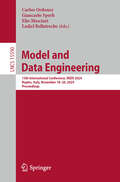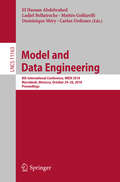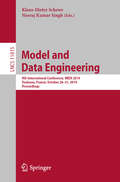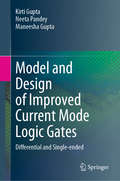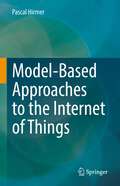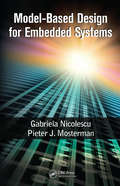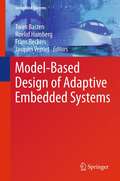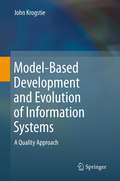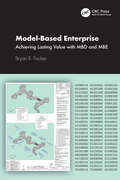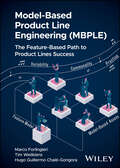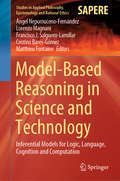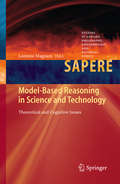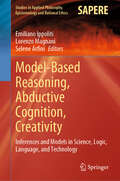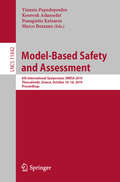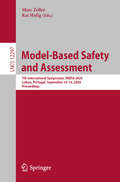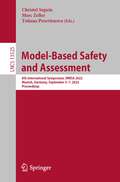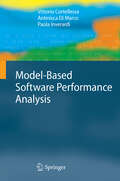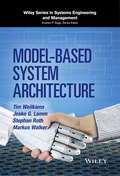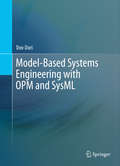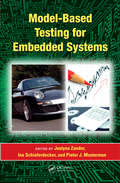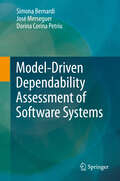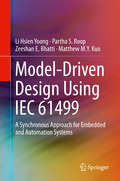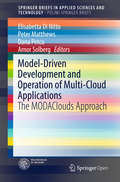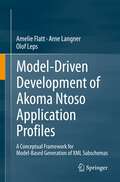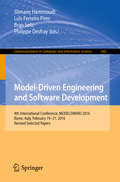- Table View
- List View
Model and Data Engineering: 13th International Conference, MEDI 2024, Naples, Italy, November 18–20, 2024, Proceedings (Lecture Notes in Computer Science #15590)
by Ladjel Bellatreche Elio Masciari Carlos Ordonez Giancarlo SperlìThis book constitutes the refereed proceedings of the 13th International Conference onModel and Data Engineering, MEDI 2024, held in Naples, Italy, during November 18–20, 2024. The 7 full papers and 11 short papers were carefully peer reviewed and selected from 45 submissions.They were organized in topical sections as follows: AI-Enabled Systems; Security and Privacy; Query Processing; Prediction; Conceptual Issues; and Applications.
Model and Data Engineering: 8th International Conference, MEDI 2018, Marrakesh, Morocco, October 24–26, 2018, Proceedings (Lecture Notes in Computer Science #11163)
by Ladjel Bellatreche Carlos Ordonez El Hassan Abdelwahed Mattéo Golfarelli Dominique MéryThis book constitutes the refereed proceedings of the 8h International Conference on Model and Data Engineering, MEDI 2018, held in Marrakesh, Morocco, in October 2018.The 23 full papers and 4 short papers presented together with 2 invited talks were carefully reviewed and selected from 86 submissions. The papers covered the recent and relevant topics in the areas of databases; ontology and model-driven engineering; data fusion, classsification and learning; communication and information technologies; safety and security; algorithms and text processing; and specification, verification and validation.
Model and Data Engineering: 9th International Conference, MEDI 2019, Toulouse, France, October 28–31, 2019, Proceedings (Lecture Notes in Computer Science #11815)
by Klaus-Dieter Schewe Neeraj Kumar SinghThis book constitutes the refereed proceedings of the 9th International Conference on Model and Data Engineering, MEDI 2019, held in Toulouse, France, in October 2019.The 11 full papers and 7 short papers presented in this book were carefully reviewed and selected from 41 submissions. The papers cover broad research areas on both theoretical, systems and practical aspects. Some papers include mining complex databases, concurrent systems, machine learning, swarm optimization, query processing, semantic web, graph databases, formal methods, model-driven engineering, blockchain, cyber physical systems, IoT applications, and smart systems.
Model and Design of Improved Current Mode Logic Gates: Differential and Single-ended
by Kirti Gupta Neeta Pandey Maneesha GuptaThis book presents MOSFET-based current mode logic (CML) topologies, which increase the speed, and lower the transistor count, supply voltage and power consumption. The improved topologies modify the conventional PDN, load, and the current source sections of the basic CML gates. Electronic system implementation involves embedding digital and analog circuits on a single die shifting towards mixed-mode circuit design. The high-resolution, low-power and low-voltage analog circuits are combined with high-frequency complex digital circuits, and the conventional static CMOS logic generates large current spikes during the switching (also referred to as digital switching noise), which degrade the resolution of the sensitive analog circuits via supply line and substrate coupling. This problem is exacerbated further with scaling down of CMOS technology due to higher integration levels and operating frequencies. In the literature, several methods are described to reduce the propagation of the digital switching noise. However, in high-resolution applications, these methods are not sufficient. The conventional CMOS static logic is no longer an effective solution, and therefore an alternative with reduced current spikes or that draws a constant supply current must be selected. The current mode logic (CML) topology, with its unique property of requiring constant supply current, is a promising alternative to the conventional CMOS static logic.
Model-Based Approaches to the Internet of Things
by Pascal HirmerThis book gives an overview of existing models that cover the whole lifecycle of an IoT application, ranging from its design, implementation, deployment, operation, and monitoring to its final termination and retirement. Models provide abstraction and can help IoT application developers into creating more robust, secure, and reliable applications. Furthermore, adaptation of applications can be eased by using these models, leading to an increased dynamic of the developed IoT applications.In the book, research of the last years in the area of model based approaches to the Internet of Things is described and these approaches are incorporated into the lifecycle of IoT applications.Finally, use cases from different domains are introduced that show how these models could be applied in real-world applications.
Model-Based Design for Embedded Systems (Computational Analysis, Synthesis, and Design of Dynamic Systems)
by Gabriela Nicolescu Pieter J. MostermanThe demands of increasingly complex embedded systems and associated performance computations have resulted in the development of heterogeneous computing architectures that often integrate several types of processors, analog and digital electronic components, and mechanical and optical components—all on a single chip. As a result, now the most prominent challenge for the design automation community is to efficiently plan for such heterogeneity and to fully exploit its capabilities.A compilation of work from internationally renowned authors, Model-Based Design for Embedded Systems elaborates on related practices and addresses the main facets of heterogeneous model-based design for embedded systems, including the current state of the art, important challenges, and the latest trends. Focusing on computational models as the core design artifact, this book presents the cutting-edge results that have helped establish model-based design and continue to expand its parameters.The book is organized into three sections: Real-Time and Performance Analysis in Heterogeneous Embedded Systems, Design Tools and Methodology for Multiprocessor System-on-Chip, and Design Tools and Methodology for Multidomain Embedded Systems. The respective contributors share their considerable expertise on the automation of design refinement and how to relate properties throughout this refinement while enabling analytic and synthetic qualities. They focus on multi-core methodological issues, real-time analysis, and modeling and validation, taking into account how optical, electronic, and mechanical components often interface. Model-based design is emerging as a solution to bridge the gap between the availability of computational capabilities and our inability to make full use of them yet. This approach enables teams to start the design process using a high-level model that is gradually refined through abstraction levels to ultimately yield a prototype. When executed well, model-based design encourages enhanced performance and quicker time to market for a product. Illustrating a broad and diverse spectrum of applications such as in the automotive aerospace, health care, consumer electronics, this volume provides designers with practical, readily adaptable modeling solutions for their own practice.
Model-Based Design of Adaptive Embedded Systems
by Roelof Hamberg Jacques Verriet Twan Basten Frans ReckersThis book describes model-based development of adaptive embedded systems, which enable improved functionality using the same resources. The techniques presented facilitate design from a higher level of abstraction, focusing on the problem domain rather than on the solution domain, thereby increasing development efficiency. Models are used to capture system specifications and to implement (manually or automatically) system functionality. The authors demonstrate the real impact of adaptivity on engineering of embedded systems by providing several industrial examples of the models used in the development of adaptive embedded systems.
Model-Based Development and Evolution of Information Systems
by John KrogstieThis book introduces and describes in detail the SEQUAL framework for understanding the quality of models and modeling languages, including the numerous specializations of the generic framework, and the various ways in which this can be used for different applications. Topics and features: contains case studies, chapter summaries, review questions, problems and exercises throughout the text, in addition to Appendices on terminology and abbreviations; presents a thorough introduction to the most important concepts in conceptual modeling, including the underlying philosophical outlook on the quality of models; describes the basic tasks and model types in information systems development and evolution, and the main methodologies for mixing different phases of information system development; provides an overview of the general mechanisms and perspectives used in conceptual modeling; predicts future trends in technological development, and discusses how the role of modeling can be envisaged in this landscape.
Model-Based Enterprise: Achieving Lasting Value with MBD and MBE
by Bryan R. FischerModel-Based Enterprise describes Model-Based Enterprise (MBE) and Model-Based Definition (MBD) in detail, focusing on how to obtain significant business value from MBE.This book presents MBE from technical and business perspectives, focusing on process improvement, productivity, quality, and obtaining greater value from our information and how we work. The evolution of MBD and MBE, from computer-aided design (CAD) topics to current approaches and to their future roles, is discussed. Following the progression from manual drawings to 2D CAD, 3D CAD, and to digital data and digital information models, MBE is presented as the method to achieve productivity and profitability by understanding the cost of how we work and refining our approaches to creating and using information. Many MBD and MBE implementations have changed how we work but yield little real business value – processes changed, engineering drawings were replaced with 3D models, but the organization achieved minor benefits from their efforts. This book provides methods to become an MBE and achieve the full value possible from digital transformation.Model-Based Enterprise is essential reading for anyone who creates or uses product-related information in original equipment manufacturers (OEMs) and suppliers, in the private sector, and in government procurement and development activities. This book is also essential for students in all engineering disciplines, manufacturing, quality, information management, product lifecycle management (PLM), and related business disciplines.
Model-Based Product Line Engineering (MBPLE): The Feature-Based Path to Product Lines Success
by Tim Weilkiens Marco Forlingieri Hugo Guillermo Chalé-GongoraClear and concise guide to MBPLE, with industrial case studies Written in a to-the-point style, Model-Based Product Line Engineering (MBPLE) is the only theoretical and practical foundational book on MBPLE that brings together the topics of model-based systems engineering (MBSE) and feature-based product line engineering (PLE). It examines how PLE can benefit from a model-based and model-centric approach and, in turn, how MBSE combined with holistic PLE can boost model reuse and improve the MBSE business case. The book combines both management and engineering aspects to deliver comprehensive coverage of the subject. The book covers real-life challenges and implementations of MBPLE, discussing adoption obstacles faced by engineering organizations and how to overcome them to ensure a successful MBPLE deployment. Dozens of SysML v2 views, SysML v1 diagrams, SysML v2 code snippets and illustrations are included throughout to elucidate key concepts. Additional supplementary learning materials are available on a companion website. Written by a team of expert authors and contributors with significant experience in the field of applied MBPLE, Model-Based Product Line Engineering (MBPLE) discusses sample topics including: Motivation for MBPLE, covering document-based to model-based engineering, project-oriented to product-line-oriented engineering, and digital continuity and system lifecycle managementFoundations of MBPLE, covering basic definitions, the history of MBPLE, recent MBPLE works and standards, and the impact of MBPLE on engineering processesImplementation of MBPLE using the next generation modeling language SysML v2Adoption of MBPLE, covering investment interests, company processes, change management and digital transformation, and methods, guidelines, coaching Model-Based Product Line Engineering (MBPLE) delivers vision, benefits, and strategic guidance for managers, executives, and business leaders while serving as a practical guide for system engineers who are new to the MBPLE discipline or already familiar with it.
Model-Based Reasoning in Science and Technology: Inferential Models for Logic, Language, Cognition and Computation (Studies in Applied Philosophy, Epistemology and Rational Ethics #49)
by Lorenzo Magnani Ángel Nepomuceno-Fernández Francisco J. Salguero-Lamillar Cristina Barés-Gómez Matthieu FontaineThis book discusses how scientific and other types of cognition make use of models, abduction, and explanatory reasoning in order to produce important and innovative changes in theories and concepts. Gathering revised contributions presented at the international conference on Model-Based Reasoning (MBR18), held on October 24–26 2018 in Seville, Spain, the book is divided into three main parts. The first focuses on models, reasoning, and representation. It highlights key theoretical concepts from an applied perspective, and addresses issues concerning information visualization, experimental methods, and design. The second part goes a step further, examining abduction, problem solving, and reasoning. The respective papers assess different types of reasoning, and discuss various concepts of inference and creativity and their relationship with experimental data. In turn, the third part reports on a number of epistemological and technological issues. By analyzing possible contradictions in modern research and describing representative case studies, this part is intended to foster new discussions and stimulate new ideas. All in all, the book provides researchers and graduate students in the fields of applied philosophy, epistemology, cognitive science, and artificial intelligence alike with an authoritative snapshot of the latest theories and applications of model-based reasoning.
Model-Based Reasoning in Science and Technology: Theoretical and Cognitive Issues
by Lorenzo MagnaniThis book contains contributions presented during the international conference on Model-Based Reasoning (MBR´012), held on June 21-23 in Sestri Levante, Italy. Interdisciplinary researchers discuss in this volume how scientific cognition and other kinds of cognition make use of models, abduction, and explanatory reasoning in order to produce important or creative changes in theories and concepts. Some of the contributions analyzed the problem of model-based reasoning in technology and stressed the issues of scientific and technological innovation. The book is divided in three main parts: models, mental models, representations; abduction, problem solving and practical reasoning; historical, epistemological and technological issues. The volume is based on the papers that were presented at the international
Model-Based Reasoning, Abductive Cognition, Creativity: Inferences and Models in Science, Logic, Language, and Technology (Studies in Applied Philosophy, Epistemology and Rational Ethics #70)
by Emiliano Ippoliti Lorenzo Magnani Selene ArfiniThis book discusses how scientific and other types of cognition make use of models, abduction, and explanatory reasoning in order to produce important, innovative, and possibly creative changes in theories and concepts. Gathering revised contributions presented at the international conference on Model-Based Reasoning (MBR023), held on June 7–9, 2023 in Rome, Italy, the book addresses various intertwined topics ranging from the epistemology and applications of models also concerning the problem of knowledge production and scientific methodology (information visualization, experimental methods, and design) to the analysis of their role in cognition, decision-making, also with respect to social implications. The problem of model-based cognition is also illustrated taking advantage of recent results regarding problem-solving, abduction, and logic, paying attention to a critique of the dominant and received approaches, to the aim of fostering new discussions and stimulate new ideas. All in all, the book provides researchers and graduate students in the fields of applied philosophy, epistemology, cognitive science, and artificial intelligence alike with an authoritative snapshot of the latest theories and applications of model-based reasoning.
Model-Based Safety and Assessment: 6th International Symposium, IMBSA 2019, Thessaloniki, Greece, October 16–18, 2019, Proceedings (Lecture Notes in Computer Science #11842)
by Panagiotis Katsaros Marco Bozzano Yiannis Papadopoulos Koorosh AslansefatThis book constitutes the proceedings of the 6th International Symposium on Model-Based Safety and Assessment, IMBSA 2019, held inThessaloniki, Greece, in October 2019.The 24 revised full papers presented were carefully reviewed and selected from 46 initial submissions. The papers are organized in topical sections on safety models and languages; dependability analysis process; safety assessment; safety assessment in automotive industry; AI in safety assessment.
Model-Based Safety and Assessment: 7th International Symposium, IMBSA 2020, Lisbon, Portugal, September 14–16, 2020, Proceedings (Lecture Notes in Computer Science #12297)
by Marc Zeller Kai HöfigThis book constitutes the proceedings of the 7th International Symposium on Model-Based Safety and Assessment, IMBSA 2020, held in Lisbon, Portugal, in September 2020. The conference was held virtually due to the COVID-19 pandemic. The 15 revised full papers and 4 short papers presented were carefully reviewed and selected from 30 initial submissions. The papers are organized in topical sections on safety models and languages; state-space modeling; dependability analysis process; safety assessment in automotive domain; AI and safety assurance.
Model-Based Safety and Assessment: 8th International Symposium, IMBSA 2022, Munich, Germany, September 5–7, 2022, Proceedings (Lecture Notes in Computer Science #13525)
by Marc Zeller Christel Seguin Tatiana ProsvirnovaThis book constitutes the proceedings of the 8th International Symposium on Model-Based Safety and Assessment, IMBSA 2022, held in Munich, Germany, in September 2022. The 15 revised full papers and 3 short papers presented were carefully reviewed and selected from 27 initial submissions. The papers focus on model-based and automated ways of assessing safety and other attributes of dependability of complex systems. They are organized in topical sections on safety analysis automation, MBSA practices, causal models and failure modeling strategies, designing mitigations of faults and attacks, data based safety analysis, dynamic risk assessment.
Model-Based Software Performance Analysis
by Paola Inverardi Vittorio Cortellessa Antinisca Di MarcoPoor performance is one of the main quality-related shortcomings that cause software projects to fail. Thus, the need to address performance concerns early during the software development process is fully acknowledged, and there is a growing interest in the research and software industry communities towards techniques, methods and tools that permit to manage system performance concerns as an integral part of software engineering. Model-based software performance analysis introduces performance concerns in the scope of software modeling, thus allowing the developer to carry on performance analysis throughout the software lifecycle. With this book, Cortellessa, Di Marco and Inverardi provide the cross-knowledge that allows developers to tackle software performance issues from the very early phases of software development. They explain the basic concepts of performance analysis and describe the most representative methodologies used to annotate and transform software models into performance models. To this end, they go all the way from performance primers through software and performance modeling notations to the latest transformation-based methodologies. As a result, their book is a self-contained reference text on software performance engineering, from which different target groups will benefit: professional software engineers and graduate students in software engineering will learn both basic concepts of performance modeling and new methodologies; while performance specialists will find out how to investigate software performance model building.
Model-Based System Architecture
by Stephan Roth Tim Weilkiens Jesko G. Lamm Markus WalkerPresents modeling approaches that can be performed in SysML and other modeling languages This book combines the emerging discipline of systems architecting with model-based approaches using SysML. The early chapters of the book provide the fundamentals of systems architecting; discussing what systems architecting entails and how it benefits systems engineering. Model-based systems engineering is then defined, and its capabilities to develop complex systems on time and in a feasible quality are discussed. The remainder of the book covers important topics such as: architecture descriptions; architecture patterns; perspectives, viewpoints, views and their relation to system architecture; the roles of a system architect, their team, and stakeholders; systems architecting processes; agile approaches to systems architecting; variant modeling techniques; architecture frameworks; and architecture assessment. The book's organization allows experts to read the chapters out of sequence. Novices can read the chapters sequentially to gain a systematic introduction to system architecting. Model-Based System Architecture: Provides comprehensive coverage of the Functional Architecture for Systems (FAS) method created by the authors and based on common MBSE practices Covers architecture frameworks, including the System of Systems, Zachman Frameworks, TOGAF®, and more Includes a consistent example system, the "Virtual Museum Tour" system, that allows the authors to demonstrate the systems architecting concepts covered in the book Model-Based System Architecture is a comprehensive reference for system architects and systems engineers in technology companies. This book will also serve as a reference to students and researchers interested in functional architectures. Tim Weilkiens is the CEO at the German consultancy oose Innovative Informatik and co-author of the SysML specification. He has introduced model-based systems engineering to a variety of industry sectors. He is author of several books about modeling and the MBSE methodology SYSMOD. Jesko G. Lamm is a Senior Systems Engineer at Bernafon, a Swiss manufacturer for hearing instruments. With Tim Weilkiens, Jesko G. Lamm founded the Functional Architectures working group of the German chapter of INCOSE. Stephan Roth is a coach, consultant, and trainer for systems and software engineering at the German consultancy oose Innovative Informatik. He is a state-certified technical assistant for computer science from Physikalisch-Technische Lehranstalt (PTL) Wedel and a certified systems engineer (GfSE)®- Level C. Markus Walker works at Schindler Elevator in the research and development division as elevator system architect. He is an INCOSE Certified Systems Engineering Professional (CSEP) and is engaged in the committee of the Swiss chapter of INCOSE.
Model-Based Systems Engineering with OPM and SysML
by Dov DoriModel-Based Systems Engineering (MBSE), which tackles architecting and design of complex systems through the use of formal models, is emerging as the most critical component of systems engineering. This textbook specifies the two leading conceptual modeling languages, OPM--the new ISO 19450, composed primarily by the author of this book, and OMG SysML. It provides essential insights into a domain-independent, discipline-crossing methodology of developing or researching complex systems of any conceivable kind and size. Combining theory with a host of industrial, biological, and daily life examples, the book explains principles and provides guidelines for architecting complex, multidisciplinary systems, making it an indispensable resource for systems architects and designers, engineers of any discipline, executives at all levels, project managers, IT professional, systems scientists, and engineering students.
Model-Based Testing for Embedded Systems (Computational Analysis, Synthesis, and Design of Dynamic Systems)
by Justyna ZanderWhat the experts have to say about Model-Based Testing for Embedded Systems: "This book is exactly what is needed at the exact right time in this fast-growing area. From its beginnings over 10 years ago of deriving tests from UML statecharts, model-based testing has matured into a topic with both breadth and depth. Testing embedded systems is a natural application of MBT, and this book hits the nail exactly on the head. Numerous topics are presented clearly, thoroughly, and concisely in this cutting-edge book. The authors are world-class leading experts in this area and teach us well-used and validated techniques, along with new ideas for solving hard problems. "It is rare that a book can take recent research advances and present them in a form ready for practical use, but this book accomplishes that and more. I am anxious to recommend this in my consulting and to teach a new class to my students." —Dr. Jeff Offutt, professor of software engineering, George Mason University, Fairfax, Virginia, USA "This handbook is the best resource I am aware of on the automated testing of embedded systems. It is thorough, comprehensive, and authoritative. It covers all important technical and scientific aspects but also provides highly interesting insights into the state of practice of model-based testing for embedded systems." —Dr. Lionel C. Briand, IEEE Fellow, Simula Research Laboratory, Lysaker, Norway, and professor at the University of Oslo, Norway "As model-based testing is entering the mainstream, such a comprehensive and intelligible book is a must-read for anyone looking for more information about improved testing methods for embedded systems. Illustrated with numerous aspects of these techniques from many contributors, it gives a clear picture of what the state of the art is today." —Dr. Bruno Legeard, CTO of Smartesting, professor of Software Engineering at the University of Franche-Comté, Besançon, France, and co-author of Practical Model-Based Testing
Model-Driven Dependability Assessment of Software Systems
by Simona Bernardi José Merseguer Dorina Corina PetriuOver the last two decades, a major challenge for researchers working on modeling and evaluation of computer-based systems has been the assessment of system Non Functional Properties (NFP) such as performance, scalability, dependability and security. In this book, the authors present cutting-edge model-driven techniques for modeling and analysis of software dependability. Most of them are based on the use of UML as software specification language. From the software system specification point of view, such techniques exploit the standard extension mechanisms of UML (i. e. , UML profiling). UML profiles enable software engineers to add non-functional properties to the software model, in addition to the functional ones. The authors detail the state of the art on UML profile proposals for dependability specification and rigorously describe the trade-off they accomplish. The focus is mainly on RAMS (reliability, availability, maintainability and safety) properties. Among the existing profiles, they emphasize the DAM (Dependability Analysis and Modeling) profile, which attempts to unify, under a common umbrella, the previous UML profiles from literature, providing capabilities for dependability specification and analysis. In addition, they describe two prominent model-to-model transformation techniques, which support the generation of the analysis model and allow for further assessment of different RAMS properties. Case studies from different domains are also presented, in order to provide practitioners with examples of how to apply the aforementioned techniques. Researchers and students will learn basic dependability concepts and how to model them using UML and its extensions. They will also gain insights into dependability analysis techniques through the use of appropriate modeling formalisms as well as of model-to-model transformation techniques for deriving dependability analysis models from UML specifications. Moreover, software practitioners will find a unified framework for the specification of dependability requirements and properties of UML, and will benefit from the detailed case studies.
Model-Driven Design Using IEC 61499
by Li Hsien Yoong Partha S. Roop Zeeshan E. Bhatti Matthew M. Y. KuoThis book describes a novel approach for the design of embedded systems and industrial automation systems, using a unified model-driven approach that is applicable in both domains. The authors illustrate their methodology, using the IEC 61499 standard as the main vehicle for specification, verification, static timing analysis and automated code synthesis. The well-known synchronous approach is used as the main vehicle for defining an unambiguous semantics that ensures determinism and deadlock freedom. The proposed approach also ensures very efficient implementations either on small-scale embedded devices or on industry-scale programmable automation controllers (PACs). It can be used for both centralized and distributed implementations. Significantly, the proposed approach can be used without the need for any run-time support. This approach, for the first time, blurs the gap between embedded systems and automation systems and can be applied in wide-ranging applications in automotive, robotics, and industrial control systems. Several realistic examples are used to demonstrate for readers how the methodology can enable them to reduce the time-to-market, while improving the design quality and productivity.
Model-Driven Development and Operation of Multi-Cloud Applications
by Peter Matthews Elisabetta Nitto Dana Petcu Arnor SolbergThis books is open access under a CC BY 4. 0 license. This book summarizes work being undertaken within the collaborative MODAClouds research project, which aims to facilitate interoperability between heterogeneous Cloud platforms and remove the constraints of deployment, portability, and reversibility for end users of Cloud services. Experts involved in the project provide a clear overview of the MODAClouds approach and explain how it operates in a variety of applications. While the wide spectrum of available Clouds constitutes a vibrant technical environment, many early-stage issues pose specific challenges from a software engineering perspective. MODAClouds will provide methods, a decision support system, and an open source IDE and run-time environment for the high-level design, early prototyping, semiautomatic code generation, and automatic deployment of applications on multiple Clouds. It will free developers from the need to commit to a fixed Cloud technology stack during software design and offer benefits in terms of cost savings, portability of applications and data between Clouds, reversibility (moving applications and data from Cloud to non-Cloud environments), risk management, quality assurance, and flexibility in the development process.
Model-Driven Development of Akoma Ntoso Application Profiles: A Conceptual Framework for Model-Based Generation of XML Subschemas
by Olof Leps Amelie Flatt Arne LangnerThis book presents a model-driven approach for creating a national application profile of the international legislative document standard Akoma Ntoso (AKN). AKN is an XML-based document standard that serves as the basis for modern machine-readable and fully digital legislative and judicial processes. The described model-driven development approach ensures consistent and error-proof application of AKN concepts and types, even when using different software tools. It allows for easy maintenance, is self-documenting, and facilitates stakeholder validation with nontechnical legal experts. The resulting application profile remains fully compliant to and compatible with AKN. For the sake of illustration, the approach is paradigmatically applied to the German federal legislative process, as a corresponding approach was used in the creation of the German AKN application profile, LegalDocML.de. We discuss how the methodology yields a model, schema definition and specification that correspond to the artefacts created by LegalDocML.de, using examples from Germany. The book is of interest to both legal and technical project teams on the cusp of introducing AKN in a legislative domain and intended as a practical guideline for teams preparing to create a custom application profile for their own domain. Furthermore, it can serve as both a resource and an inspiration for similar and yet to be developed methodologies in the public sector, the health sector or in defense, where international standardization and interoperability efforts are to be applied to a local level.
Model-Driven Engineering and Software Development
by Slimane Hammoudi Luís Ferreira Pires Philippe Desfray Bran SelicThis book constitutes thoroughly revised and selected papers from the 4th International Conference on Model-Driven Engineering and Software Development, MODELSWARD 2016, held in Rome, Italy, in February 2016. The 17 thoroughly revised and extended papers presented in this volume were carefully reviewed and selected from 118 submissions. They are organized in topical sections named: modeling languages, tools and architectures; methodologies, processes and platforms; applications and software development.
